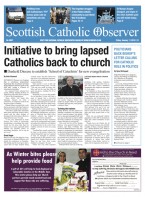January 18 | ![]() 0 COMMENTS
0 COMMENTS ![]() print
print

Faith must not be confined to the RE department
Addressing the ‘elephant in the room,’ Fr Michael Kane says we must take action to keep our schools Catholic
I remember well my first days as a priest, fresh faced and just out the wrapper! Within a short time I was appointed as school chaplain, splitting my time between St Margaret’s High in Airdrie and St Andrew’s High in Coatbridge.
They were very different communities with very different characters. But they had one thing in common. For the first couple of years the new intake of staff and pupils of both schools gave me that strange look which said: “Are you really old enough to be a priest!”
More than seven years on, I find myself as chaplain to St Ambrose High in Coatbridge where (unfortunately) no-one gives me that look anymore!
Much has changed in my life over the course of these years. Not only do I have the onset of grey hair to diminish my youth, but my idealised vision of ministry in the secondary schools has also changed and developed.
Much of that change has come about as a result of the Church’s new relationship with the modern world.
The centenary year of Catholic state-run schools was an occasion to be inspired by the extraordinary work of schools today, and the achievements of our young people in classrooms up and down the country. These are real treasures that we should rightly celebrate.
I think it should also, however, be a time to assess where we are 100 years on, and to ask the difficult question, often the elephant in the room: how Catholic are our Catholic schools at this moment in our history?
I believe that a century on we should be secure, confident and bold enough to ask these kinds of questions.
While the fruits of Catholic schools are patently evident, it is a naive observer who would fail to see new challenges emerging in our schools that can have a debilitating effect on the character and ethos of these nurturing communities.
Each year the number of lapsed pupils in our schools seems to increase. Self-professed atheism is now very popular, even fashionable, among the ranks of students, even if it is not fully understood.
Religious education classes become battlegrounds between those in two seemingly opposing camps where science is pitted against Faith, religion against reason.
Those who say that faith schools are bad for children because they promote intolerance or because they ‘brainwash’ children have clearly never observed an RE lesson in a Catholic school!
These are places of vigorous debate where young people don’t hide their opinions and dissenting voices.
Yet, such an environment can make it difficult for practising Catholics to express their Faith.
Many Mass-attending pupils can feel seriously out-of-step with their ‘enlightened’ classmates and this kind of peer pressure can be the catalyst for stepping back from their Faith practice.
In my experience very few third year pupils are comfortable to raise their heads above the parapet when it comes to Faith issues. Understandably, such inner strength is difficult to find in those formative years.
Perhaps a more worrying trend is the increasing number of lapsed Catholic teachers in our schools.
This presents a real difficulty when more and more teachers are incapable or unwilling of engaging with the first priority of the school which is to hand-on and teach the Catholic Faith.
The old saying rings true: “You cannot give what you don’t already have.”
This is self-evident when it comes to transmitting the Faith in a classroom. Teaching the doctrines of our Faith loses all its traction and dynamism if it comes from a place which is empty of lived experience. And the pupils know it. So how do we counteract these trends?
Certainly action is needed. But not the type of action which compels. In my own experience, this generates poor results.
Of course, I would love to see more parents eagerly living and passing-on the Faith at home.
This is the real source of so many of our ills which inevitably find their way into the classroom.
The current religious malaise among our young people rests at the door of parents, first and foremost A school can never take the place of the domestic Church, and teachers cannot be expected to ‘parent’ the children they teach.
After these years as a chaplain in different high schools I believe the solution lies in a simply and achievable ambition: promoting good example at every level. The Faith must be taught and caught!
This means teachers and support staff and janitors and cleaners and pupils and parents getting the small things right. It means moving away from this idea that Faith is confined to the RE department.
It means not leaving your Faith at the school gate when the bell rings in the morning.
For a Catholic teacher: simply try to be faithful Catholic in you own life. Attend Mass at school when you can, begin and end lessons with prayer, hang a crucifix in your classroom, don’t shy away from sharing your Faith with the pupils you love and serve. There’s really no need to overcomplicate things. Live your Faith and let the Lord do the rest.
As for myself, I feel blessed to be chaplain to St Ambrose High which is an exceptional school, like so many others.
Our school family is made-up of dedicated staff and amazing young people who inspire me every day.
The leadership in our school is wholeheartedly focused on the primary aims of Catholic schools: evangelisation and mission.
Yet our school, in the Catholic heartland of Lanarkshire, faces the same challenges as any other.
We, too, experience changes which impact our Catholicity. We, too, are adjusting to secular trends and trying to forge a new relationship with the modern world which is hardening to Faith.
Thinking back to my first years as a school chaplain I felt an urgent need to respond to these challenges with an array of new pastoral initiatives and programs.
In time I realised that it is much more simple, since Faith must be both taught and caught.
The greatest witness I can give to others is to show what Jesus means to me, to trust in the power of prayer, and to offer a hand of friendship where I can.
In other words, live my Faith joyfully, stop worrying about the future and let God do the rest. After all, it’s His school!










